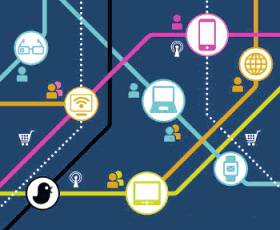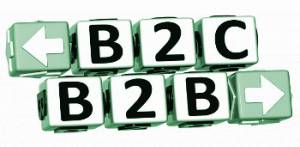Table of Contents
e-Business
In a digital world, without e-Business
you will do little conventional business.
What is e-Business?
When one looks for the definition of e-Business, one will encounter many versions. At eQTeam we prefer using the following simple one: e-Business is the use of digital technology to support business1).
For on-line companies like Google, Amazon and Facebook all of the business processes revolve around e-Business. And even traditional companies are forced to change their business by customers demanding the use of internet and other digital technologies as a communication means. e-Business changes the collaboration and relation between providers and customers.
For us, e-Business is an umbrella which covers terminology like e-Commerce, e-Marketing, e-Procurement, and even e-Infrastructure.
Why pick eQTeam?
- We ensure that complex e-Business systems work when they go live.
- When all components seem to work well, but your e-Business system as a whole does not, we will find the weak links and fix them.
- We can always be of service if your e-Business requirements comprise of more than a simple website or webshop.
- We implement a complex e-Business system using a roadmap and step-by-step approach, since big bang implementations will always fail.
Do not hesitate and contact us now.

e-Business projects are complex
e-Business projects are complex, because traditional systems and company databases in the back-office need to communicate with various internet technologies which are used in the front-office. All these components need to be integrated to build successful e-Business applications. When webshop orders do not reach the back-office system, you will not sell much. Nor will you, when large customers are not able to send requests-for-purchase from there procurement system through e.g. an Open Catalog Interface.
For IT in general, but e-Business applications specifically, the saying goes: the devil is in the details. eQTeam focuses on the details, but will never lose the broader view. Gradually but decisively we will work from milestone to milestone towards a successful final result.
Targets of e-Business
- B2B stands for Business to Business and applies to connecting 2 or more systems of different companies. Besides technical challenges companies will be confronted with several organizational ones. In practice, the organizational aspect is frequently underestimated.
- B2C stands for Business to Consumer, where the consumer is often a person who is in contact with a company's automated system. A webshop is a typical example of a B2C-application. Businesses need to be aware that many different kinds of users exist, which use different kinds of browsers in a way that might not always be logical and rational.
- Nowadays some more obscure abbreviations appear: B2G where G stands for Government, and B2B4C which would signify business to bussines for consumers (in case of retail products). Nice try, but not really different.
At eQTeam we think that B2B and B2C are essentialy different. Both kinds of projects demand a different approach.

e-Business divided by function
- e-Commerce is often used as a synonym for e-Business, but we rather see it as an activity aimed at selling to businesses and private individuals using internet technology. The department of sales would be the ideal location for an e-Commerce position.
- e-Marketing stands for the use of websites and social media to transmit advertising messages to private consumers. Marketing budgets are specifically aimed at reaching out to specific user groups.
- e-Procurement means connecting a customer's procurement system to a supplier's webshop or electronic catalog. In the majority of cases, a long-term purchase contract exists for delivery of certain products for pre-determined prices. From the procurement system, the customer places a request-for-purchase and receives a cart via punch-out right back. The real order placement including authorization at the customer's site are finalized in the procurement system while the actual order is often sent by a different (electronic) way to the supplier.
- e-Infrastructure is a relatively new flavor. After the invention of cloud computing and virtual servers a company's infrastructure no longer exists of physically present server and client computers within the company. Servers can be anywhere on the internet, and can even be scaled up or down depending on the need for computing power. Scalable computers allow for rates per CPU-cycle.
Colofon
General information
Quotations
This site contains own material as well as text and image quotations.
Cookies
eQTeam uses cookies to ensure that we give you the best experience on our website and to gain insight into its functionality and effectiveness. Gathered data will not be used to track individual users. If you continue to visit our pages, we'll assume that you agree with the placement of cookies on your device.
Recommended websites
Our website
This site has been built using a modified and enhanced version of DokuWiki. Layout is responsive, modern, and well legible on most devices.